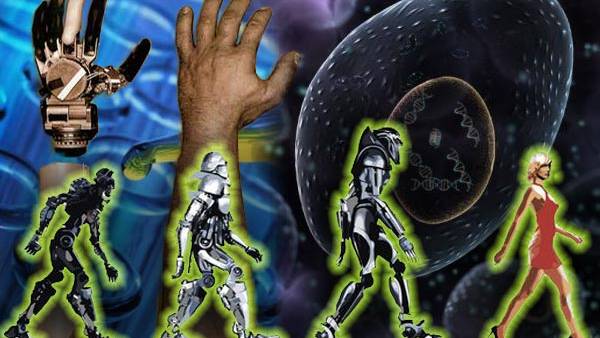Pentagon Looks to Breed Immortal ‘Synthetic Organisms,’ (Molecular Kill-Switch Included)
Source: wired.com

The Pentagon’s mad science arm may have come up with its most radical project yet. Darpa is looking to re-write the laws of evolution to the military’s advantage, creating “synthetic organisms” that can live forever — or can be killed with the flick of a molecular switch.
As part of its budget for the next year, Darpa is investing $6 million into a project called BioDesign, with the goal of eliminating “the randomness of natural evolutionary advancement.” The plan would assemble the latest bio-tech knowledge to come up with living, breathing creatures that are genetically engineered to “produce the intended biological effect.” Darpa wants the organisms to be fortified with molecules that bolster cell resistance to death, so that the lab-monsters can “ultimately be programmed to live indefinitely.”
Of course, Darpa’s got to prevent the super-species from being swayed to do enemy work — so they’ll encode loyalty right into DNA, by developing genetically programmed locks to create “tamper proof” cells. Plus, the synthetic organism will be traceable, using some kind of DNA manipulation, “similar to a serial number on a handgun.” And if that doesn’t work, don’t worry. In case Darpa’s plan somehow goes horribly awry, they’re also tossing in a last-resort, genetically-coded kill switch:
Develop strategies to create a synthetic organism “self-destruct” option to be implemented upon nefarious removal of organism.
The project comes as Darpa also plans to throw $20 million into a new synthetic biology program, and $7.5 million into “increasing by several decades the speed with which we sequence, analyze and functionally edit cellular genomes.”
Of course, Darpa’s up against some vexing, fundamental laws of nature — not to mention bioethics — as they embark on the lab beast program. First, they might want to rethink the idea of evolution as a random series of events, says NYU biology professor David Fitch. “Evolution by selection is not a random process at all, and is actually a hugely efficient design algorithm used extensively in computation and engineering,” he e-mails Danger Room.
Even if Darpa manages to overcome the inherent intelligence of evolutionary processes, overcoming inevitable death can be tricky. Just ask all the other research teams who’ve made stabs at it, trying everything from cell starvation to hormone treatments. Gene therapy, where artificial genes are inserted into an organism to boost cell life, are the latest and greatest in life-extension science, but they’ve only been proven to extend lifespan by 20 percent in rats.
But suppose gene therapy makes major strides, and Darpa does manage to get the evolutionary science right. They’ll also have a major ethical hurdle to jump. Synthetic biology researchers are already facing the same questions, as a 2009 summary from the Synthetic Biology Project reports:
The concern that humans might be overreaching when we create organisms that never before existed can be a safety concern, but it also returns us to disagreements about what is our proper role in the natural world (a debate largely about non-physical harms or harms to well-being).
Even expert molecular geneticists don’t know what to make of the project. Either that, or they’re scared Darpa might sic a bio-bot on them. “I would love to comment, but unfortunately Darpa has installed a kill switch in me,” one unnamed expert tells Danger Room.
Article from: Wired.com
"Can we create new life out of our digital universe?" Craig Venter asks. His answer is "yes" -- and pretty soon. He walks through his latest research and promises that we'll soon be able to build and boot up a synthetic chromosome.
In 2001, Craig Venter made headlines for sequencing the human genome. In 2003, he started mapping the ocean's biodiversity. Now he's working to create the first synthetic lifeforms.
Video from: TED.com






















